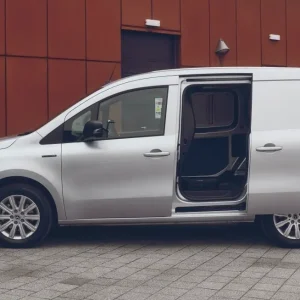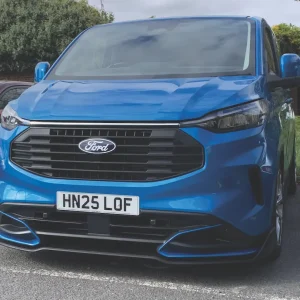February continued the strong start to the year in the new van market with total sales up 8.5% year-on-year to 17,540. Registrations in the dominant 2.5 to 3.5t sector, which includes large vans, grew 14% to 12,125 units to capture almost 70% of the market in a reflection of the trend towards larger units driven by strong demand for retail delivery vans.
In the first two months of the year, sales of vans weighing from 2.5 to 3.5t were up by a quarter year-on-year to 27,663.
The Ford Transit was the second biggest selling van in February with 1,529 registrations and the Mercedes-Benz Sprinter (872) and Renault Master (672) were also among the 10 top sellers.
Mercedes-Benz has unveiled a new version of its eSprinter electric van, which is set to be the main rival for Ford’s E-Transit. The model will initially be available as a panel van, with a chassis cab variant to join the range subsequently. A choice of two vehicle lengths will be available. There will be three battery sizes, with the largest having 113kWh of capacity, enough for a range of up to 248 miles on the WLTP cycle, or 310 miles on the WLTP city cycle. The other batteries will be 56kWh and 81kWh units. Max charging speeds will be by 11kW at an AC wallbox, and 115kW at a DC rapid charging station, with the latter allowing a 10–80% charge in 28 minutes for the 56kWh battery, and 42 minutes for the 113kWh battery. Two electric motors will be available, producing 136hp or 204hp.
Meanwhile, three new security pack options from TVL Security are now being fitted to Ford Transit vans. The packs are made by TVL at its factory in Essex, before being shipped to Ford’s factory in Turkey for fitting to the vans.
The SlamHandle Security Pack features solid stainless-steel latch shields on the rear and side load doors to stop thieves drilling through the mechanism to access the vehicle and side and rear doors which automatically lock on closure to add an additional layer of protection and save time for multi-drop drivers.
The HookLock Security Pack has been designed to delay entry and is suitable for those leaving valuable equipment in the van overnight or for a long period of time. Features include a front door loom guard, deadlocks on the driver and passenger doors, and hook locks on the side and rear doors.
The ArmourShell Security Pack offers the same benefits as the HookLock option but with the added visual deterrent of external semi-automatic locks on the side and rear doors, with anti-drill inserts and a hardened steel locking bolt.
Utilities contractor Falco has TVL security equipment installed on 100 of its new Transit vans but in its case the installations were carried out by ProtectAVan.
The latest Commercial Van Safety Ratings conducted by testing organisation Euro NCAP in partnership with Thatcham Research, saw no vans achieving the top Platinum rating, with the previously top-tier Fiat Professional Ducato dropping down to a second-tier Gold rating alongside the Ford Transit. The Mercedes Sprinter and Volkswagen Crafter both secured a Silver rating while the Citroën Relay, Iveco Daily, Vauxhall Movano, Peugeot Boxer and Renault Master were ranked Bronze. The Nissan Interstar, however, was Not Recommended based on its lack of crash avoidance systems.
Despite the fact that no van achieved a Platinum rating, Thatcham said manufacturers overall had improved ADAS on vans compared to a year ago.





